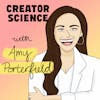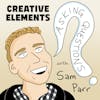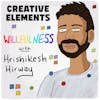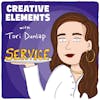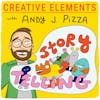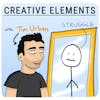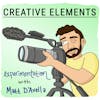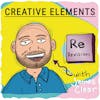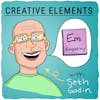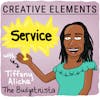
#24: Tiffany Aliche, The Budgetnista – Paying off debt, saving for retirement, weathering a recession, and building wealth
Play EpisodeTiffany "The Budgetnista" Aliche is an author, speaker, and founder of the Live Richer Academy.
Tiffany "The Budgetnista" Aliche is an author, speaker, and founder of the Live Richer Academy.
Since 2014, The Budgetnista’s LIVE RICHER Challenge movement has helped over 1 million women from 100+ countries save more than $100 million, and pay off over $75 million in debt, purchase homes and transform the way they think about their finances.
In this episode, we talk about Tiffany’s financial education, the scam that left her with $35K in credit card debt, how she paid off that debt, the way she thinks about home buying, savings, and how her focus on service helped her build a multi-million dollar business.
Transcript and show notes can be found here.
***
LISTENER SUPPORT
Join our community on Facebook
Support this show through Buy Me A Coffee.
***
SPONSORS
Try Podia and save 15% for life as a Creative Elements listener
Start your free trial of SavvyCal and get your first month free using promo code ELEMENTS
ABOUT JAY CLOUSE
Subscribe to my weekly newsletter
Enroll in my course on podcasting, Podcast Like The Pros
***
PODGLOMERATE NETWORK
This show is a part of the Podglomerate network, a company that produces, distributes, and monetizes podcasts. We encourage you to visit the website and sign up for our newsletter for more information about our shows, launches, and events. For more information on how The Podglomerate treats data, please see our Privacy Policy.
Since you're listening to Creative Elements, we'd like to suggest you also try other Podglomerate shows surrounding entrepreneurship, business, and careers like Rocketship.fm and Freelance to Founder.
Learn more about your ad choices. Visit megaphone.fm/adchoices
Tiffany Aliche 0:00
So I got my financial friends to teach inside of my online school. And at first I remember it was 10 bucks a month. And now 30 bucks a month for the online school. We have 40,000 students and we make like a million bucks a month. That's crazy.
Jay Clouse 0:07
Crazy.
Tiffany Aliche 0:09
Crazy.
Jay Clouse 0:10
Welcome to Creative Elements, a show where we talk to your favorite creators and learn what it takes to make a living from your art and creativity. I'm your host Jay Clouse. Let's start the show.
Jay Clouse 0:41
Hello, welcome back to Creative Elements. Thanks for choosing to spend a little bit of your day here with me. I'm excited to spend it with you. At the beginning of the COVID lockdown my girlfriend Mallory suggested that the two of us watch the newest season of Queer Eye on Netflix. And if you're somehow not familiar with Queer Eye already is a show where a team of five gay professionals called the Fab Five give lifestyle and fashion makeovers to their guests. Usually these like amazing people who are down on their luck or could just use a helping hand. And it's actually marketed now as quote more than a makeover, because they really do more to generally uplift these guests and help them out. Now, let me tell you if you haven't already watched this show, it's exactly what your quarantine needs. It is the most uplifting show they go above and beyond to help their guests out. And a perfect example of that is in the fourth episode of season five, the Fab Five help a man named Tyreek, in part of their approach was to help him improve his credit score and financial situation. And to do that, they sat down with Tiffany "The Budgetnista" Aliche and as I'm watching this episode, I realized that she would be a fantastic guest on the show. And of course I also asked Tiffany about the Fab Five. I need to know if those Guys are even more amazing in real life than they are in TV because there's a serious hole in my life now that I've watched all those episodes.
Tiffany Aliche 2:05
Yes they are but I also got to meet I only got to meet one but he was seriously amazing.
Jay Clouse 2:10
And that is a huge relief because I don't know what I would do if they were not. Okay. Anyway, let's get back to the guest at hand here. Tiffany "The Budgetnista" Aliche is an author, speaker and founder of the Live Richer Academy since 2014. The budget needs to Live Richer challenge movement has helped more than 1 million women from more than 100 countries pay off over $75 million in debt. they've purchased homes and transformed the way that they think about their finances. These women that participate in the movement call themselves Dream Catchers. Her financial advice has also been featured in The New York Times. The Today Show, Good Morning America, CNN, Time and Forbes. She also blogs about personal finance for the Huffington Post and co hosts and award winning podcast called Brown Ambition. But before all of that she was a preschool teacher.
Tiffany Aliche 3:03
I became a preschool teacher because I knew I wanted to live a life of service. I saw a documentary with Fred Rogers, Mr. Rogers, and who doesn't love Mr. Rogers. And I just remember thinking like, I want to be like Mr. Rogers, which is so odd for like a 19 year old. That's how I was. And so I watched that, I saw the documentary, he had this plaque on his wall that said, the purpose of life is to live a life of service. And like a light bulb went on, and I said, Hmm, I was in school for business. And I was in my last year, and I realized I hated my my corporate internships, and but it's kind of too late to turn back now. Um, so I decided after graduating, I was going to become a teacher, because that was a life of service, which I did. But I also remember thinking, I want to live a life of service, but I don't want to be broke. How do you manage those two things? And so I realized, well, one being a preschool teacher, I lived frugally, and then I invested and I really said no to the things that didn't mean that much to me. So I could say yes to the things that did like travel, and buying my home and having fun with my friends.
Jay Clouse 4:05
And even as a preschool teacher, her friends looked up to her as the one who really had her finances figured out. So much so that even when she fell prey to a credit card scam, her friends continued to look to her for advice.
Tiffany Aliche 4:19
So what happened was I was living that life, I was helping my friends with their financial issues. And then when I hit my financial roadblocks, even though I was struggling, my friends were like, Yeah, but you're struggling with style Tiffany, because you can be working it out despite the fact of losing everything. I've lost everything and I have not move the needle. And so that's how the budget needs to start. It was like, Look, I've messed up. I can show you what I'm doing to unmess up my mess up.
Jay Clouse 4:45
We cover a lot of ground in this episode, including some financial questions that I get asked quite a bit. We talked about Tiffany's financial education, the scam that left her with $35,000 in credit card debt, how she paid off that debt, the way she thinks about home buying, savings and retirement and how her focus on service helped her build a multi million dollar business. As always, I'll be sharing some more about Tiffany in our private Facebook group this week. Just search for Creative Elements listeners on Facebook. And if you have thoughts throughout this episode, you can find me on Twitter or Instagram at Jay Clouse. But now, let's hear from Tiffany.
Tiffany Aliche 5:31
My history as it relates to money really starts me elementary school learning about personal finance at home with my parents and having day to day lessons that I totally thought were normal. I'm like so you don't do Thursday night Monday class. Hmm. Interesting. You know, and so Um, but yeah, learning things like how much the mortgage was, watching my mom food shopping, had her negotiate and then her having us negotiate. My father, doing the bills at the dining room table and then letting us use his like accountants calculator with the paper that came out of the back. I remember I used to love that thing.
Jay Clouse 6:07
What a gift from your father and your parents sounds like your mom was involved too, to help you guys look at money as just kind of a fact of life and then tool.
Tiffany Aliche 6:16
This was commonplace for me. So my first introduction to money wasn't from a place of fear. It was curiosity and interest, and we didn't have a lot of money coming up. So even in that my parents were really good at not presenting it in such a way that made my sisters my four sisters and I feel worried about money because they could say something like, Hey, Mom lost her job. And you know, that means Christmas regardless actually opened our presents in January. I remember that actually happening. And we weren't freaked out. We were just like, okay, because there was open conversation. And then fast forward to I want to say my mid 20s I literally just did everything my dad told me to do when it came to my money. So I was financially perfect because my dad I'm sure by then I don't know maybe he was in his 40s or like early 50s or, and when I was in my mid 20s and so on paper I was like as financially sound as like a 50 year old because I was just like I had a $40,000 save. I bought myself a condo when I was 25. I was a preschool teacher then so I wasn't even making a ton of money. I bought my first car cash. My dad took me to the auction, I bought it for $5,500. I remember it was a Nissan Altima. It was black, and I loved that little car, and my insurance was like 60 bucks a month because the car I own it, and I just had liability. I remember my rent was 550 because my sister and I moved out together my oldest sister, and we moved out when I was 23. And we split the rent so I was doing all the things that I was told to do. So by 26, I bought the condo, and it probably wasn't the best idea because that was right before the recession was coming, but who knew I didn't. I wasn't aware right that a recession was looming. But I do remember distinctly that even my realtor and the bank were trying to pressure me to purchase a home that I knew I couldn't afford, like I knew based upon my budget that I could afford a home that cost no more than like, I think like 250. But they were trying to convince me like, Oh, no, you can afford a home that's $300,000 or more. And I was like, I'm looking at my budget and it doesn't, it doesn't equate, you know. So I would say until 26, my finances were perfect. I didn't have any issue with them. My relationship with money was solid. And then I did what kids are apt to do, which is to kind of go out on their own and totally screw up everything your parents have taught you.
Jay Clouse 8:37
It's about time 26, It's about time to make mistakes.
Tiffany Aliche 8:41
Exactly. So I went from no debt, because I paid off a little bit of undergraduate debt that I had, because I commuted and my parents helped out, and so I didn't have much in undergraduate on debt. So I had paid that off. My credit card debt has been paid in full every month. So I was debt free. And then you know, by 26 I had my student loan debt for my masters. So that was like $52,000. But I wasn't freaked out because people borrow money for school. And then I also had my $220,000 debt for my condo, but I wasn't freaked out because that's a mortgage. But I was freaked out later when I decided to start investing because I thought, I'm in a good space, it's time to learn to invest in instead of investing I invested in the scam that left me $35,000 in credit card debt.
Jay Clouse 9:27
Tiffany talks pretty in depth about this credit card fraud on ChooseFI Episode 240 she met a con artist she calls Jake the liar who convinced her that he had an opportunity she could invest in by using funds from her credit cards. That investment opportunity didn't actually exist. But Jake had made off with 10s of thousands of Tiffany's dollars before she realized that.
Tiffany Aliche 9:49
So I went from knowing nothing to feeling like I owed everything within a matter of just a couple of years and I would say by 27 to 28 I was If things are not looking good by 29 I've lost my job as a teacher. I've been a teacher for 10 years and so now I owed all this money and I had no money coming in and the recession was here and so many of us had no job so it was just externally it was depressing and then internally it was depressing and that's when I had my first kind of that with money sucks that's what I was telling myself. Money is hard, money sucks.
Jay Clouse 10:26
Something that you talked about there when you're talking about your masters debt, your student loan debt and then your condo debt. And then you kind of put this credit card scam and this debt into seemingly a different bucket.
Tiffany Aliche 10:38
Yeah.
Jay Clouse 10:38
So I'd love to pause here and talk about is there good debt is there like okay debt, how do you think about debt and is it all created equal or not?
Tiffany Aliche 10:47
So I don't believe in that good debt bad debt term, right? Because I'm just like, who was anybody? Right, but I will say there there is like, I call it like, I guess debt and bad debt. So they I guess debt is like I guess I have to go to school, I guess. I mean, I have to live somewhere. But ideally, it'd be awesome not to owe anybody, you know. And then there is bad debt, which is debt that the interest rate is oppressive. So double digits, you know, 10%, 20%, 30%, you know, so that is terrible bad debt. And I guess that is student loans, your mortgage, even your car within reason. I mean, I know that there's some financial gurus that tell you buy everything in cash. And that's cute. And it sounds great because I'm actually a cash girl. I'm debt free right now. My husband and I were able to purchase our home in cash because it was a foreclosure. I've never had a new car. I've always purchased every car I've had in cash, whether the car was $3,000 or $20,000. And I was able to purchase it in cash, but it's not realistic for most people. I don't like when I hear financial gurus. I'm like, I'm not a financial guru. I'm like your financial girlfriend, right? I don't like when I hear this black and white version of money. Because it's so limiting, most of us live in the gray. And so I don't believe in that black and white approach. I believe that I like to teach to the gray because that's where most of us live. So, yeah, so I would say yeah with with that it's not ideal because you're really ideally, the number you're wanting to keep an eye out for is your net worth. And your net worth is what you own. What puts money into your pocket assets, minus what you owe, what takes money out of your pocket liabilities, so the more you own, and the less you owe, the better. So that's why I said debt is never a good thing because it's something that you owe and it lowers your net worth, which is really the number that you kind of look at to see the health of your overall finances.
Jay Clouse 12:42
I love that perspective. And I love owning the fact that so much of everything in life is in the gray like of course we know that the best case is this and we also know that almost nobody is doing the perfect thing or following the best case any percent of the time. When it comes to you bought a condo when it comes to home buying.
Tiffany Aliche 13:00
Yeah.
Jay Clouse 13:01
How does that affect your net worth is that an asset that is lifting your net worth or if you have a mortgage is that you know, something that is bringing you down as a liability.
Tiffany Aliche 13:10
It's a mix. So some of what you so what the owning part is part of your asset. So let's just say like I told you guys, I bought this the house I live in now. And it was a foreclosure. So it's 50% off. So let's just say I had a mortgage right on the house, and it was $100,000 two houses worth, I'm just making up numbers, but then we paid 200,000. And let's just say we had a $200,000 mortgage. So that 200,000 that we owe is on the liability side, but we have equity in that house. And so that equity that we own, the part of the house that we own is on the asset side. So net net if we own 200,000 of the house, but we owe 200,000 of the house. Basically the house is making our net worth. It doesn't make it increase or decrease because 200,000 minus 200,000 is zero So your net worth is not moving with our current house, you know. So that's how you look at it when you're purchasing something that might be partially asset and liability, and you put the part that you own on the own side, and then put the part that you owe on the old side, and then you subtract the two. So I think that when you're purchasing a house, everyone should think of purchasing a house as an investment. Too many people purchase a house, and they're just like thinking of the emotional component. I want the kids to have a yard, I want to have a dog, I want to live next to mom and dad, whatever that looks like. It is one of the largest investments outside of like your education that you're going to make. So if I said right now, hey, Jay, you know what you'd like to invest in, you know, $200, $300, $400,000, and it's a guaranteed loss, you would think I'm crazy, but that's what people do with their homes. It's like, no, let's, you know, let's be mindful. So there are a few ways to think about it when you're purchasing a home, that it can be an asset, so it's finding a home that's undervalued. And some of the ways is like, you know, maybe the house like our house needed some work, you know, so we knew that like, okay, the amount of money we put in for the work, the house is going to be worth more than that amount of money, you know, finding a house in a neighborhood that is that the neighborhood is transcending or like moving upward, you know, because you know, like, okay, the values of the homes here are growing, you know, or you might purchase a home, like my parents live in a really nice neighborhood now, where it's just a neighborhood, you know, those cities and towns are just always nice, you know? And so the housing prices have always gone up, no matter what's going on externally, because this is this is just one of those nice neighborhoods. So being mindful of like, Am I going to purchase this home that I'm going to live in? And is it going to appreciate me and going up go up in value? And if not, then maybe you want to look into like a multi family house. You know, you get to family, you live on one side and let your tenant pay the mortgage on the other. So there are many ways to look at your home and to navigate your home your personal home as an investment.
Jay Clouse 15:57
I bring it up because I'm in a season of life where me, my friends, everyone's thinking about like, Is it time to stop renting and start investing in a home? And people have very strong views on both sides of this? Yeah. You know, again, we live in the gray. Yeah, depends on people's preferences. So, before I move on from this topic, is there anything else that you'd recommend to other people in the audience or listening to this? Who are thinking? I've been renting for a long time? Am I just throwing money away in rent? Or should I be thinking about getting a mortgage?
Tiffany Aliche 16:28
I will say this that that homeownership in the United States of America is definitely one of the biggest cornerstones for wealth. Here's why. Because let's just say you're 25 you know, you purchase a house, and you know, you have that same house by the time you're 60, 70. There's a strong likelihood that that house has gone up in value, even though you didn't have to put that much in to start with that house. You know, so my parents bought the house they live in now, when we were kids and they bought it for 250. That house is now worth about 750 or 700,000 that's why it can be a cornerstone for wealth because they didn't really have to invest in the market, they just bought one asset and because of the nature of where they purchased it, it went up in value. So I will say, it certainly can help if that is your goal, to grow wealth because now what they can do is they can sell the house and use the excess and, and and live off some of that in their retirement. But it's not that everyone purchases a house the right way, you can literally purchase a house that leaves you broker by the end, I would say up until the last recession. That was like the last cut off of the 2008, 2009 recession was like the last cut off when it was like no, definitely get a house because that taught us not necessarily, you know, it taught us that like ah, like, I wish I would have known then that I would have gotten a mortgage that was quote unquote rentable, meaning that I had to move from my condo. My mortgage was 1,660 and I can only rent out my condo for about 1,200 dollars. So That's something if I would have known like I had that condo that I could have rented the area, the rent that the area could bear was 1,250. Then I could have rented out that condo and continue to pay my mortgage and not lost it to foreclosure. So I say that you know, buying a house is not a bad idea, but buying a house incorrectly definitely is.
Jay Clouse 18:19
When we come back, Tiffany explains how she climbed back out of debt and how she recommends others can do the same right after this. Welcome back to Creative Elements. When we left off, Tiffany had gone from perfect finances to grad school loan debt, mortgage debt and $35,000 in credit card debt. So the budget needs to set out to fix her situation.
Tiffany Aliche 18:43
So I started with the terrible debt, right that is the credit card debt. And it's terrible because it was double figures. And so one of the things I did was if you know you're about to experience financial trauma, like you're like a lose my job I can tell. pandemic quarantine. Just whatever you just know, you're about to lose your job. before that happens, you want to look at your debt and reorganize it. Like I was like, Okay, I'm about to lose my job, I'm not going to have the money to pay my mortgage. Before that late payment hits. Let me look at my credit card debt and reorganize it. And what I did was, I did balance transfers, because I had two cards with the interest rate was pretty high double figure, so like 10,12,13,14,15%, but I knew I still had good credit, so I had not missed a payment yet. So I opened up two or three new balance transfer cards where I took my balance from the high interest rate cards and put it to my new low interest rate cards. And because my credit still was so good, I was able to get I think one was almost like two years and or one particular was like a year at zero percent interest, and then after that 5% or something like that. And then another was like 15 months of zero percent interest, and I was like, Yes. So I transfer that money over and the reason why you're wanting to pay less interest is that when you pay off debt, some of your money goes to actually what you owe. And some of it goes toward fees. And those fees are interest. So the more you can pay toward the debt you actually owe, the more actually, you can pay down your debt faster. And so I would doing so helped tremendously. So even though I was on unemployment, I had to move back home with my parents. It took me about almost three years, but I paid off that $35,000 in credit card debt, while mostly on unemployment, because all of the money that was paying toward the credit card debt was going toward the principal because I'd gotten rid of the interest at least for the next 16 to 24 months. So that was what I did first, I made the decision that I had, I think my unemployment was like $2.200 a month, my mortgage was 1660. And the rest of my bills added up to like a little over $2,000. And I said, well, who who's not going to get paid mortgage you're not going to get paid. I'm just going to have to set that up. It is what it is. Student loans, thankfully, I can set you aside legally and not pay you. And so I'm going to focus on this credit card debt and once I did, I was like a That's a big burden off my shoulders. And then then I was going to focus on my student loan debt and be aggressive toward my student loan debt. Then a light bulb went on. And I said, well, what's the desired outcome? Then you should ask yourself this is your listening. Is your desired outcome to be debt free? Or is your desired outcome to grow wealth? Because debt freedom is not the same as well. And people will tell you in the hashtag debt free community, yes, it is. Okay, well, you know, who's debt free? my four year old nephew, Roman comes over every weekend. He eats cookies, pizza, my drinks, my juice. He eats pizza every time he comes here. Roma doesn't have a mortgage, a car, no, he doesn't have any bills. And Roman is still broke. He's still broke. And I tell people all the time like that debt free should be a goal, not the goal.
Jay Clouse 21:49
It feels like a spectrum. You know, you go from in debt to debt free. Yeah. Well, yes. That's not how some people think of it.
Tiffany Aliche 21:57
No, most A lot of people think of debt free as like the goal itself as if when I'm debt free somehow that's going to translate into wealth and it doesn't. And here's the thing too, I want you to focus on the wealth because it's in the wealth, you can come back for debt freedom. So I'll give an example like how I took care of my student loan. So I had 5,200, forbearance, forbearance forbearance for like, years. And I said, instead of that money in that time, that energy I was putting toward paying down my credit card debt. I'm now going to pivot and put it toward growing my business. So year one in business, I think I made like $10,000- $15,000 a year to maybe like 20 or 30,000. You're three then like, 50 a year for like 150 you would think, oh, now's a perfect time to pay off the student loan debt. I said not yet. Then you're like four or five, I made 500,000. And then so as I'm growing, it wasn't until despite the fact I had a seven figure business, then I was like, Okay, now I can work on this student loan debt. And guess what, I didn't have to work on it for months and month a month. I went to my bank account and ever one check. So you see like so it wasn't necessarily even on the way to wealth It was like I had grown wealth and I went back for debt freedom.
Jay Clouse 23:12
That's such a interesting take I hadn't I've never thought about a process like that because a lot of people listening to this show you know, whether they are debt free or not, they're probably pretty close and they're they're looking for a similar lifestyle to what you have now you know, they want to build equity in their own business they want to build their own products they want to get to a place where they're working on their own things because they want to work on their own things. I hadn't thought about the process of well you can invest in that business you can invest in yourself and believing in yourself and yes, I can pay debt is a little risky.
Tiffany Aliche 23:44
It is, so I will say that that like I that's why I got rid of the like terrible debt. So I would you have to get rid of your credit card debt first. That comes before the business. Absolutely. But you see, I came back for the I guess that because that debt with the lower interest. So let's just say you invest in the business, it's two years, three years, four years, and you really don't see that it's going anywhere. Coming back to the I guess that it's not so bad, it doesn't mean you're not paying it all the time. Maybe you put your student loans in deferment, maybe you're paying the minimum, so you're not neglecting the debt. One, the debt has lower interest. So it's not double digit figures. And two, you're either paying, like I said, the minimum or for putting in forbearance. So it doesn't mean that you're not going to take care of it. So if you find that the business doesn't take off, that debt will be there. It will have grown but not have grown as fast as credit card debt will, will have. But the fastest way to get into the life that you want to meet is to bet on yourself. So you know yourself. Are you really willing to do the work? People will tell me all the time I'll take the I work hard, I'm like, Yeah, but are you doing the work required? working hard in the work required are two different things. You know that there are times when the work required is early morning, late night and okay, but then there are some times when the work required is that you have this two hours and you're super focused. So I was willing to bet on myself. And you're right. It's risky. But I don't know that there's anything riskier than betting on something externally, at least with me. I know.
Jay Clouse 25:09
And we're kind of living through that right now. A lot of people have lost their jobs. Yeah. Does this does this give you deja vu to back to 2008?
Tiffany Aliche 25:17
Yes. And you know, it's so crazy. I feel like you know, how people plan for the Olympics. It's like, every eight years.
Jay Clouse 25:21
Mm hmm.
Tiffany Aliche 25:22
And, you know, you're like, how do people stay the course for that long I and Olympic recessioner, because I remember the last recession devastated me so much. I said, I will never ever, ever come back to this place where I lose my job, my house, my home, my happiness, my money. I had to drain my bank accounts to pay bills. I had to drain my retirement account to pay bills. I said, Oh, never ever, ever, ever, ever. And so for the recession to come back around and meet me the way it's met me with not just one house paid off, not just two, but I also paid off my parents house two years ago. And like my husband, our cars are paid off. So it literally means let me in that most ideal circumstances situation, so much so that it might have actually done better than the recession than I have before. That when you have set yourself up in a certain way that you can actually thrive during most other people's difficult times, because money doesn't just combust. It goes from one place to the next. So if a massive amount of people are losing money, it means that there's another group of people who are then gaining that money. And so like, so if you find yourself in this recession, like wow, this really took me for a loop. It took me as well. And recessions come around every 10 to 15 years or so. So it's coming back. How will it meet you? Once she survived past this? What are you going to put into play? So when it comes back around you on the other side, you're on the receiving end versus the losing end?
Jay Clouse 26:47
I've got to drill into this a little bit more because, you know, you said if you feel hardship coming on, maybe it's your job, maybe it's something else, look at your debt and reorganize it. Is there anything else that in this moment as we're kind of going through This uncertain time these "unprecedented" times. Is there anything else that you're telling people? Here's another step that I would be taking.
Tiffany Aliche 27:08
So yes, I, I want you to one, forgive yourself. I know it sounds weird like from a financial like whatever person but I already know that you're beating yourself up telling yourself like oh my gosh I should have done this and that time I had sushi. I could have stayed home or whatever it is, those times are gone. I can't tell you how many times I added up lunch in my head. I'm like, Oh, this would have been red, you know. It's done and it's okay. You're human. And I'm sorry. I never heard of Coronavirus until recently, how I've never been to a pandemic The last time we had one was 100 years ago. I'm not 140 So how would I have known right to one forgiving yourself and letting that go and letting go of that that shame and fear and saying and wants you to work on what I call being a paper towel person. So as much as I love my dad, he is not a paper towel person. That means when I spilled juice as a kid you were going to get that "juice again, Tiffany, you're so clumsy to have to be careful. We don't. It's five kids who don't have extra juice money", right? And my mom would just get up and calmly get a paper towel. She was a solution based person. And so I really practice because I'm more like my dad. I'm totally like, "Tiffany, you messed up. We talked about this, what are you doing?" So I really work hard to try to be a paper towel person and get straight to the solutions. Because guess what, after my dad finishes bussing, he would still have to get me a paper towel. So even after all the fussing, you still have to get to the solution.
Jay Clouse 28:34
It's like the same solution but doubling down on your like pain.
Tiffany Aliche 28:39
Exactly. So get straight to it. Right. So that's one I would say for folks who are in that position now is that you have to switch that mindset from one of the lame to one of responsibility. So responsibility is blame minus the shame. So it's like I'm taking ownership of this thing, but I'm not ashamed of this thing. So that's first and foremost. Second, yes. Certainly looking at your debt reorganizing it. Third, you might need to drop down and get your noodle on. Remember college or whenever that at some point everyone has to live on ramen noodle budget, right? So for you, it might be rice and beans, it might be peanut butter and jelly, it might be whatever. But that's super cheap meal that most young people can afford, right? And so what that means is to look at your budget and say, What are the things here that if I was on a ramen noodle budget, I would take off, and it doesn't mean you have to live there, but everyone should know their noodle budget. So that's your budget with just the bare bones essential expenses. So knowing what that is, and depending on when you think that trauma is coming, if you know what's going to come in a month or two, most jobs give you a heads up these days. So you know if it's coming in a month or two drop down and get your noodle on and start stacking as much savings as possible. And for some people, it's like that's not even enough. And then that's when you have to make the what I call the health and safety decision. And that's where I was 10 years ago on during the last recession where I had to look at my budget and said, What things here must I do I have to have to maintain my health and my safety. Everything else, it's just not going to get paid. I'm sorry, Verizon, you're going to just be mad. Like, you know, so I have to pay rent, because it takes care of my health and my safety, I have to buy medicine takes care of my health and my safety. There are some things that literally, which was so hard to say, they're not going to get their money right now. So depending on where you are, you might be in a health and safety space where things are going to have to be late, okay. You might be in a noodle budget space where I could drop down low enough where even though I'm making less I can still maintain my basic bare bones essentials, okay? Well, you might be in a space where I am now where, you know, you've actually had an influx so now it's for me, it's doubling down on investing even more, and doing even more to solidify my future.
Jay Clouse 30:53
After a quick break, Tiffany and I talk about short term savings and planning for retirement as a creative and A little bit later we walk through the major milestones for her and moving past debt freedom into wealth through her business. Trust me, you'll want to stick around and we'll be right back. Welcome back to Creative Elements and my conversation with Tiffany "The Budgetnista" Aliche. Before I dive deeper into Tiffany's own journey with the budget Nisa, I wanted to use this opportunity to ask her a few questions both about saving in the short term and for retirement.
Tiffany Aliche 31:28
So the purpose of budgeting so you can say the purpose of saving so you can invest the purpose of investing is to grow well, some people get stuck there like budgeting for budgeting sake, now, you're budgeting so you can save I'm saving for saving sake, no, you're saving so you can invest. you're investing to grow wealth and to secure your future. That is the order of things ought to be. So when it comes to saving for retirement or setting aside and investing for retirement is one you want to get your budget to a space where you can consistently save, then you want to save especially As a creative six months to a year of emergency saving, so I'm noodle budget saving. So if your life cost you $5,000 a month, but your noodle budget is 3000 because you're like, I don't really have to have all these things. If things got tight, then you're going to save three times 618 thousand dollars at minimum especially as a creative more if you can. Once you've done your at least six months, as I said, as a creative now any excess savings goes towards investing. So we're going to when it comes to investing, first we're going to secure your financial future and invest for retirement, because there's two levels of investing for me anyway. Investing for retirement and investing for wealth. Right. But investing for retirement is to take care of your older self. I even named my older self Her name is Wanda. Wanda is sassy. Right and sometimes Wanda is in no in a rocking chair and the front of her front of her front porch and sometimes Wanda's peeking out the window, minding her neighbor's business, right. And so I think about Wanda when I make these two So I look after my Wanda and, and so that's, that's the next order after you've maxed out your six month saving, then that extra money goes toward setting aside for your Wanda. And what I would suggest is is that you look for depending on what you know, people sometimes will say they're self employed, but they really work for their company. So like I am an employee of my company. So you're going to want to make sure whether it's a solo IRA, you know, you like like a solo entrepreneur, if you're looking for a set a set because you are self employed. It might be a traditional IRA or a Roth IRA, you want to set aside money in a retirement account. That is tax advantage, like in some sort of way, whether you don't get taxed on the front end, or you don't get taxed on the back end, you want to max out your tax advantage options first. And I like mutual funds index funds in particular, because there are two types of mutual funds there are there are actively managed mutual funds. So that's when like is literally a person who is like picking the stocks and they're trying to beat the market. Right. And then there's passively managed mutual funds, which are just called index funds. And an index fund is literally not trying to beat the market. It's just trying to mimic the market. And you might say, Well, duh wouldn't beat the market. I'm gonna rock out with the actively managed mutual funds, not so fast, because there's a higher fee associated because you have to pay that person who's doing all the active management, where is with an a passively managed index fund, you know, there's it's just a computer system mimicking a specific market. So like S&P 500, dow, Dow Jones, and so, so that's what you're going to look for I I suggest that you're looking for aim, an index fund that mimics the market you can get either aid. Some people like a total market index fund, that's literally all the stocks big or small, or you can get a fund that mimics a particular market like the S&P 500, the top 500 companies so a lot of financial experts will say to start with the S&Pfive To The Top 500 companies in the United States. So that just means you're going to put your money into this index fund. You can put like, you know, whatever amount of money every single month, and it's just going to do what the market does. As the market goes up, your money goes up. As the market goes down, your money goes down. And you might think, well, I don't want it to go down. But you have to understand that the market will go up and down. But overall, it goes up over time. And so, on average, the last hundred years, the market has seen, on average, a 10% increase, year after year. So not that this year, we're going to see a 10% increase, it means that some years that increases 30%. Some years the decrease is negative 20%. But we averaged it all together. It's 10% a year. That's a really good return. No, so if you put your money in a mutual fund, index fund, S&P 500 a total market fund, you're likely to yield by the time you are ready to retire. Whatever money you put in, that, you know you're likely to yield 10% on that money. I tell But to be conservative to save at least 7% to 8% I guess technically speaking 10%. So that's what I would start with as far as my retirement account. And then if you've maxed out your your tax benefit retirement account, then you can start investing for wealth in a non tax advantaged account. And that's it. Those are just brokerage accounts. So you might want to start investing in individual stocks, you might use like a robin hood app, or you might use like a like a Vanguard or Charles Schwab. Or you might want to purchase ETF so ETF is like if a mutual fund, which is a basket of stocks and bonds and, and financial instruments, and a stock had a baby, because a mutual fund, you can't trade on the stock market, and the stock is just one company, not a basket, that's an ETF is that those two had a baby, an ETF is a basket that's traded. So but I tell people if you don't do anything else, get yourself an index fund, put your money in there every month and let it do what the market does and you'll be better than most people.
Jay Clouse 36:57
I want to clarify a couple of things real quick. I'm one of them being you said savior six months of a ramen noodle budget.
Tiffany Aliche 37:05
Mm hmm.
Jay Clouse 37:05
Are you just saying putting that into like a regular old savings account in a bank or under a mattress somewhere?
Tiffany Aliche 37:10
Yes, I say I mean a savings account me even though it doesn't see my deal. As I say savings account in an online only bank right now everybody's bank some interest that they're paying is trash. But it won't always be so bad, hopefully. But even though you're not making any money on their savings, that's not the purpose of that money. The purpose of that money is times like now. It's my job, everything is going out. It's like, Oh, my God, I've got six months to figure it out. That's what that's for. You know? And then after that, then yes, if you you can outpace whatever loss you're getting and savings by investing your money with the excess.
Jay Clouse 37:45
And the other thing I wanted to clarify, you mentioned, some people say they're self employed, but they're actually employed by their company. And I think the point of clarification there if you're self employed, usually that's like a single member LLC, right. And when you're employed, you're talking about probably a S corp or support?
Tiffany Aliche 38:01
Yes. Mm hmm.
Jay Clouse 38:01
Okay. So
Tiffany Aliche 38:02
So like, Mm hmm. So just because I remember I made that mistake where I was actually still contributing to my SEP that for that's for self employed people, because we're so used to say I'm an entrepreneur, but I had already switched my company over to an S Corp. So I was still contributing to a, a retirement vehicle that I was no longer eligible for. Because I am now Tiffany works for the budget east. I'm not just the budget East anymore. And so I was like, yikes. So we have to fix that. So I just want you to make that distinction that if you have an LLC, and it's not a corporation, then you are self employed. But once you become, you know, have an S corp or C Corp, that you actually work for your company and and you can't you won't be eligible for certain retirement vehicles.
Jay Clouse 38:45
The question of SEP has come up a lot because a lot of people that are my clients or my listeners, they're LLCs, and they're saying, well, should I do this? Or should I do an IRA? Do you have any real quick ways of even just thinking about how they should think about that?
Tiffany Aliche 38:57
So I would say the benefit of us That is you are allowed to, I can't remember how much you can do now, but you can put in so much more money than a traditional or Roth IRA like a Roth right now. It's like, I think it's $6,000 for the year, but with a set, I can't remember the amount, but it's like, it's a significant amount of money 24,000, but significantly more than what you could put in a traditional or Roth IRA. And the reason is because the government recognizes that you as a self employed person are taking a huge risk with your future to the giving you the opportunity to set aside because they know that most entrepreneurs don't last. So they're giving you an opportunity to set aside a significant amount of money. The rule of thumb is not to hire full time, like a financial planner advisor unless you have $250,000 of investable assets. And this is because the cost to do so is going to erode any earnings or gains that you get with them right. So but it doesn't mean that there are people that you can hire to ask questions of. So there are financial planners who might work for like hourly, it might be $100-$150 to ask these questions like, hey, I've got five or six questions, I want to bang them out. It's worth that you might spend, say, $200-$300 a year getting your questions answered. So that way you can make those decisions yourself.
Jay Clouse 40:21
Now that I've gotten a lot of my general personal finance questions answered, I want to dig in deeper to Tiffany's own story. She's come a long way from being in debt and teaching preschool classes. So how does she build her business and the budget needs to brand.
Tiffany Aliche 40:35
I was doing a lot of volunteer work when I was unemployed, so I didn't have to be home and hear my parents mouth. Um, so I was like, No, no volunteer today. I can't stay for another lecture. I did a lot of volunteer work. And in so doing, I collected a lot of emails because you know, like, I would see someone posts Oh, looking for volunteers for the YWCA or YMCA or whatever. So I would reach out and the dude email with the like with the organizer. So I collected those emails over time. And when I was starting the budget Nisa, I'd reached out to my mentor, Christine Love and she, she had one of the very first nonprofits in Newark, New Jersey where I live that had garnered like a million dollars worth of grants. She's like a superstar to me. And so I reached out to her was like, how can I, you know, move to the next level with the budget. He said, she was like, you should get grants, so you should get contracts. And I said, okay, but that was the only advice she gave me. She literally said, gotta go, you know, figure it out. And I was like, What? Okay, so I, I was, I thought to myself, well, how do you get contracts and I started thinking of different organizations. And I said, You know, I have emails from all these organizations over the last two years that I volunteered for, let me just reach out to them because many of them even though I wasn't volunteering in the financial space, they still knew me. Volunteering is such a great way one to figure out what you want to do. Two to make connections because people meet you in the best case scenario, they meet you at your best you're serving you're giving, you know. And so you know, I reached out, I think I had 50 emails, I reached out and was like, Hey, it's me, Tiffany, volunteer from whatever. I'm teaching financial education now. And I would love to see how there's some synergy with your organization. And of the 50, only the United Way wrote back and I remember her name was Catherine Wilson, who I just was hanging out with yesterday. We're still friends like 10 years later. And she wrote back Oh, Brooke, who used to work here who you're emailing no longer works here. I was like, wait, why? Can I meet you? She was like, sure. And so we met up. And what I didn't know is that so it was her first first week in a new job. She was a data data analyst before that. And she just become the new community director and her job was to have the United Way be in the community more so it was like perfect timing. So imagine if you just don't ask, if you don't ask the answer is always no. And so it grew from there and I got my first contract.
Jay Clouse 42:58
And if you do ask you You get told no 98% of the time. And it doesn't matter.
Tiffany Aliche 43:03
Exactly because that that one contract. What I didn't understand is that the United Way was such a well known name. Of course, I'd heard of it. But I didn't know that it carried a lot of weight. Because it's almost like the United Way says that you're legitimate. This is like an international nonprofit that's been around for how many years? So then other organizations were like, Oh, you work with the United Way? Well, yeah, we'd love for you to work with us. And I was like, really. So you just don't know what door is going to be the thing that opens up the rest of the doors. And for me, it was definitely the United Way. And it allowed me to meet the community because I was able to now share on social. Hey, come take my free classes. And it was really the cornerstone for the rest of the budget needs to business with building this amazing community. But it started with with the United Way and in that contract.
Jay Clouse 43:52
I love what you're saying about volunteering as a way of figuring out what you like to do. It strikes me I've never thought about this before. Creating content and creating resources for free doing things online is essentially volunteering is a great way to serve and to learn, like, do I like doing this? Because,
Tiffany Aliche 44:10
Yeah.
Jay Clouse 44:11
I'm gonna get paid a lot in the beginning.
Tiffany Aliche 44:12
Yes and honestly, to what you don't like there was so many things that like I say, I stumbled and bumbled my way to success. So after the United Way I like so I remember the first class it was like five people at it. I said, Uh Oh, this is not looking good. So I reached out, I said, Catherine, can I like advertise on social media? Not even advertise because there was no such thing as business, Facebook, but I just said, Can I post or I can get people to come? Because what I was really thinking is, if none of the people show up to these classes, I'm not going to get the contract next, next go round. And she was like, Sure. So I started posting on social Facebook in particular, like, hey, come to my free classes. And after like the cohort would be about six weeks. So I will teach a class every Tuesday for six weeks and then I would get more people for the next class. After a while people started reaching out to me that didn't live in New Jersey or New York or the surrounding areas and I live in Florida. I live in Connecticut. And I was like, Well, I don't teach in Florida, Connecticut. And that's when the light bulb went on. And I said, Well, what if I can take this class, this six week series I created for the United Way, and take it online to extend the service. And so I did. And I created something called the Live Richer challenge, which changed the trajectory of like The Budgetnista. And my goal, my role, and my goal was in my first year in 2015, when I rolled it out. I wanted to get 10,000 women signed up. And it took me all year to convince like posting every single day and posting the link to get 10,000 women signed up for this thing I was giving away for free all my financial friends and all my business friends said I was a fool because they're like, doesn't make you not making any money. And I thought, well, maybe I'll do the first one. And then after that, I'll try to get sponsorship. So I rolled it out. And I remember right before it was it was December, and someone said, Is there going to be a corresponding book? And I was like, Well, why would you want to get a book that costs money when the challenge is free? Because Hello, Tiffany You remember, you want to make money. I couldn't believe I even said that. You know? And so I said, Okay, so I got some young college student to take because the challenge was an email course and a blog course where it was a 36 days and every day, I would put a full blog post explaining what today's homework was and how to achieve them. The first one was every week had its own theme. Week One was budgeting. Week two was savings, week three was credit and debt and insurance and investing. And so every day was related to that week's theme of like, do this, do this, do this do this in order. So it was very teacher, Tiffany. And he took all my blog posts, put it in a book, I put it up on Amazon and my first book, the one we budget. I mean, now it's sold 10s and 10s of thousands of copies, but by then it had sold like nothing. My first book took two and a half years to get on the Amazon's bestsellers list. My second book delivered your challenge book, the one that's attached to the free challenge took two and a half days.
Jay Clouse 46:52
Amazing.
Tiffany Aliche 46:52
I couldn't believe it. And I was like and when I made it, the challenge cost me about 10,000 I don't ignore I found the money. It was just like 200 here 100 Here, the coffee if I added it all up about $10,000 to build the literature challenge, and that first month in January, I sold $10,000 worth of books.
Jay Clouse 47:10
Amazing.
Tiffany Aliche 47:11
And I was like we're in business.
Jay Clouse 47:15
Something that's evident from Tiffany's website and social media accounts is the amount of press attention that she's gotten over the years and continues to receive. As I shared in the beginning, I first found Tiffany through Queer Eye, but she's been featured on Good Morning America, The Today Show, The Reel, and a lot more. So I wondered how much of that was intentional on her part, or just good fortune?
Tiffany Aliche 47:37
So I'll say this, that, um, I was very intentional in the beginning with PR, so I joined something called Haro help a reporter out.
Jay Clouse 47:44
Yeah,
Tiffany Aliche 47:45
Mm hmm. So that was on my home. I used to have a list of homework that I would give myself every day. You have to do this. You have to do this. And Haro was one of them. I would go on that site. I would, they would email me like, you know, 10,000 emails a day. If you ever sign up for Haro, get a separate account. 10,000 emails a day, but I would tell myself that I would have to answer the email within the first half an hour, you might as well just leave it because the reporter after that is inundated with emails, right? So I was very especially the first year or two, I was really intentional, because I assumed that more press meant more money. It does not. What more press means is that you can charge more. I didn't, I thought that press was going to i have i've only seen once or twice, and it's not been traditional press where I have done a thing and seen an uptick in sales. And it was like a really popular podcast. It wasn't like the real. It wasn't a Queer Eye none that moves the needle for sales. But what it does is it allows you to be more of an authority. And when you could say I am the premier expert in that, that that you can charge differently. So that's what I've seen the benefit of press is is that press begets more press, press get your face out there, it builds trust, it builds expertise. It doesn't necessarily For me anyway, I haven't seen a drive a tremendous amount of sales. But it has definitely allowed me to charge more for the things that I do.
Jay Clouse 49:06
Can you actually just walk through from 2015 when you had this first challenge up to today, some of the milestone moments or like major learnings and getting to this point with The Budgetnista?
Tiffany Aliche 49:17
So the challenge was the first one. And then I said, After that, I wasn't going to automate it. I just thought, Oh, it's done. And someone said, Can you automate it because I missed it. So 10,000 people signed up and by January 2015, by the end of 2015 20,000, people had signed up to the automation and then the books were just selling automatically, because I learned to then go in and put like, if you want the book, you can get it here. You don't have to, but if you can get to here so all of a sudden, now I'm making a few thousand dollars a month in book sales from something that I'm giving away for free.
Jay Clouse 49:47
Wild,
Tiffany Aliche 49:48
And I didn't even have to do much advertising because the people who took it, were telling for me they're like, this is amazing thing. Mom, Dad, cousin, sister, brother. And then I learned so another pivotal moment was when I learned about affiliate marketing, I'd never really heard of it. But then the first one for challenge, there was a bank that I particularly liked Ally Bank. And I was telling people, you know, this is the savings account that I really like. And I didn't know but at the time Ally Bank was giving you $25 per person that you signed up. So, you know, I cried when I realized that 2,500 people have signed up, and it was $75,000.
Jay Clouse 50:20
For me, I didn't want to do the math.
Tiffany Aliche 50:21
i know it was like some tears, I cried. And, um, and so that was like, more than I made like, in like, you know, two years as a teacher, but I learned that lesson, and then I started to put affiliate links, and the things that I was always already talking about inside delivery channels. So that was that affiliate money was like another like, Uh huh. So what I was learning to do was to monetize the service, right? So it's free for you to take this thing that I'm doing. But I'm going to tack on if you'd like the corresponding book, great. But if you also sign up for them, this app or this resource or this whatever, okay, great. How else can I monetize the service? So that's when I realized like, okay, I can also do speaking engagements. So colleges started to reach out another aha moment is when I realized that colleges are a great place if you're creative to to pitch your proposal, because the way it works is that colleges figure out they're they're. And I learned this from like a 17 year old who was like junior class president, they figure out their budget in the beginning of the year, then they give it to the kids. So if I'm going to speak at a high school, it's like they start the process of figuring out the budget then. But if I'm going to speak at a college, the hard work is already done. And it's a 17 year old that's making a decision whether or not to pay you $10,000. I'll take my bets with a 17 year old. And so I started to hit the college circuit because it was all these like clubs that had all this money, they could decide whatever they wanted. They had like, of course, like a student, or teacher advisor, but for the most part, they got to decide. So that was enough. Another pivotal Hmm. How else can you because at my core, I'm a teacher. So a pivotal moment is how many different ways can I teach I could teach through books, I could teach to the challenges I could teach on stage I could teach you. So then I remember learning like, Huh, I know how to write curriculum. My master's was in education. And that's one of the things we learn. So I started to write curriculum. And I wrote curriculum for NASDAQ, for example, and curriculum for other schools. That was a big lump sum of money. So what I was learning along the way was how to monetize the thing that I did best, which is service and teaching. And so huge pivotal moment was when I connected with my now business partner, and he's like, I love what you're doing. And I don't recommend business partners for everyone, but it was such a good fit, and that we're on the same page. And he brought something to the table that I didn't, he was an excellent marketer. And that's when digital marketing was really starting to take off. So I said, I don't want to give you a piece of my business The Budgetnista cuz that's my baby. But what if we start a side business and we did and we started something called my Live Richer Academy. And that's because everyone was going through my challenges which were free, and they wanted the next level because my challenges were basic financial education for free. But they wanted to learn how to invest or get real estate or estate plan or retirement. So I got my financial friends to teach inside my online school. And at first I remember it was 10 bucks a month. And now 30 bucks a month for the online school. We have 40,000 students and we make like a million bucks a month. That's crazy.
Jay Clouse 53:17
Crazy.
Tiffany Aliche 53:18
Crazy. Yes. I mean, I mean, 30 bucks a month talk for all this access. But do you see how I built from, hey, I'm doing these in person, like one on ones, you know. So that's how it looks at first in the beginning, they're like, you know, hand to hand one on one, then one too few. That's me inside of in front of a classroom right? Then once a many that's me on stage at a college or, or church or whatever, right? Then one to infinite. That's you online because there's like there's no amount of this. I mean, so like I learned to take that same skill set and multiply it again and again and again. And now. Now you'll reach a certain level that where you have built trust with your audience, that you can roll up Other things. So, for example, I just recently lost my first children's book to teach children age appropriate financial education because I wrote a law in New Jersey, helping to make financial education mandatory for middle school students in New Jersey, because we already had a law for high school. So I wrote this children's book called Happy birthday, Molly Moore, right. And so within the first month and a half, we sold 10,000 books, you know, but that's because of years and years and years and years and years and years of trust built up that's from that one on one years. It's a wonder exactly and so when you do that, there's very few things that I can roll out like I there was a brand that reached out to me and they said, Hey, Tiffany, we're giving away free financial workup of all the things that you need to do right and so I just did it so I sign up for their thing for free. I took it it was very similar to what I just paid my financial advisor 1,200 dollars for something Oh, this is awesome. sent out an email to my email list. So he collected email along the way is essential, or you can have zero people on social and have a decent email list and have a million dollar business. So I've been collecting emails along the way all this time. And so I signed up for that financial plan. And you know, I was like, wow, this this free one is exactly what I got from my financial advisor for 1,200 dollars. So I wrote to my email list and said, Hey, here's a company that reached out to me, they want you to sign up for a financial plans. I'm sure they wanted to like they wanted to then you know, you could pay.
Jay Clouse 55:21
Sequence and then sell them and yeah.
Tiffany Aliche 55:22
Exactly, yes. Which is good. And I'm always asking my audience like, you know, send it to your spam, whatever, but the truth is, I just got something that just paid 1,200 dollars for get it while it's hot. So I think anything of it, they paid us $25 a person. Within three days sale we made $130,000.
Jay Clouse 55:39
Unbelievable.
Tiffany Aliche 55:40
I couldn't believe it. I was like, wait, what literally the company called me and said, Please turn it off. I'm like, turn. They were like, dude, like you spent our year's budget on marketing in three days. And I'm like, I can't turn it off. It's an email. And so after that, because of that, that we built a deeper relationship there like we're going to create a special relationship with you that we don't do with any other influencer. I always call it that. The Jordan relationship, right? Jordan comes to Nike, he doesn't just say, Oh, I wear these shoes. He they create a new relationship where he has his own shoe, his own brand within Nike. But that only comes with look how many years of putting in the work of service service service of consistency of teaching. And so now I know I can confidently I've done this over and over again, where I've done partnerships with friends, where I'm like, hey, you've got this really great service, we'll do the marketing, which is just a set of emails and some social posts and things like that. We'll do a few lives. I mean, last time we did that $250,000 made in three or four days, and a friend who has never made six figures in a year is now making six figures in a in a weekend. You know, but so but that's all possible because I don't think there's anything extra special about me other than I am consistent. Day in, day out day in day out I call my daily deposits are you depositing daily and to your dreams. So whether that's thinking about it, it might be a Google search. It might be a book to read, it might be a podcast, are you depositing daily into your dreams? If you do so, I'm not promising you're going to have some seven eight figure your business, but I am promising is that you are going to be in a different space than you were before. Because the rule is if you plant you will reap. So people think now like oh my gosh, Tiffany, like, you know, you're 100,000 miles a week. And that sounds crazy. No, that was a seed that I planted 10 years ago. So now Yes, I planted an acorn and now I have this huge oak tree that I can shake at any moment and knock down 10,000 100,000 acorns. But it was 10 years to plant that tree to look after it. And so it's not going to take 10 years for everyone but it's going to take consistent planting if you're going to want to read.
Jay Clouse 57:56
stories like Tiffany's are so inspiring. Watch it show on Netflix and you see someone who seems to have it all figured out. And then you realize, Oh, she was just getting started just like me not that long ago. And to go from being the victim of a financial scam to helping more than a million people with their own financial situations is just an incredible story. This episode really reinforced a few things for me. First, the value of serving others first, sure, Tiffany missed out on $75,000 in affiliate fees, but that's because she was so focused on serving others that she missed it. And that's why this all worked in the first place. And second, this is just another creator and a long list of creators who have told us about the value of email lists and affiliate marketing. If you want to learn more about Tiffany's work, you can visit TheBudgetnista.com or follow her on Instagram @thebudgetnista, links to both are in the show notes. Thanks to Tiffany for being on the show. Thank you to Emily Clouse for making the artwork for this episode. Thanks to Brian Skeel for mixing the show and also creating our music. If you'd like this episode, you can tweet at me @JayClouse and let me know. And if you really want to say thank you, please leave a review on Apple podcasts. It goes a long way. Please, please, please go ahead and do that. Thanks for listening. And I'll talk to you next week.
Most Popular Episodes
New to the show? Check out some of our most popular episodes.






